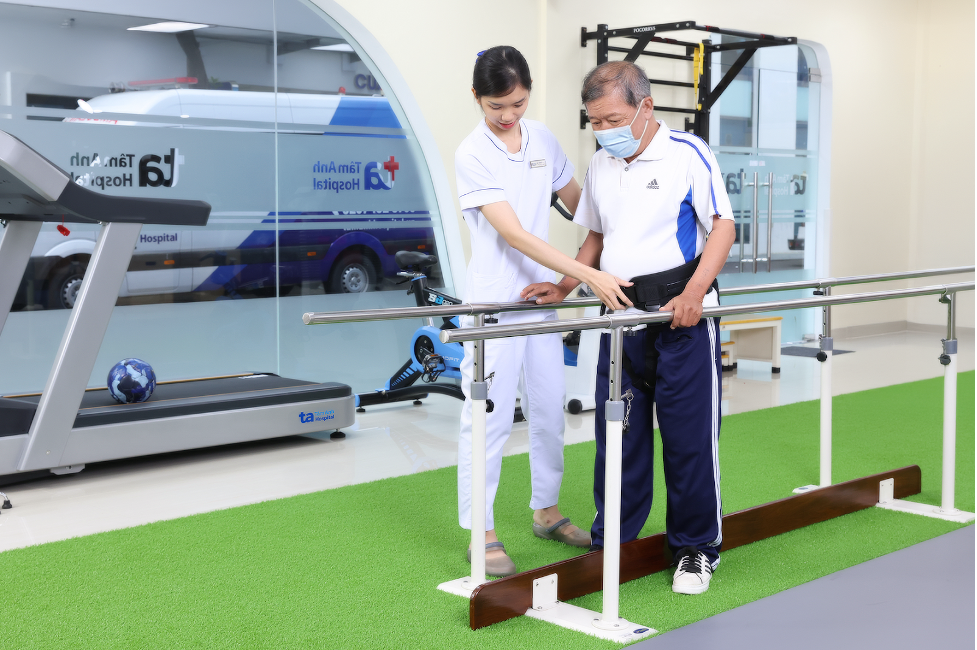After a stroke, patients often experience difficulties with movement, speech, and mental well-being. Proper home care can significantly improve recovery and long-term quality of life.
Dr. Do Thi Thu Hang from the Neurology Unit at Tam Anh General Clinic, District 7, emphasizes that even mild strokes carry a risk of recurrence without proper monitoring, treatment, and care. In addition to medication and regular check-ups, patients and their families should focus on four key areas of care.
Physical therapy and rehabilitation are crucial. After the acute phase, patients should begin moving as soon as possible under the guidance of a therapist or trained caregiver. Simple exercises like changing positions, massaging limbs, and passive range-of-motion exercises improve blood circulation and prevent joint stiffness and muscle atrophy.
As their condition improves, patients can practice sitting up, standing, and walking with assistance or using a cane. Speech therapy can also help those struggling with communication, starting with simple exercises like counting and naming objects, progressing to more complex tasks as abilities improve.
 |
A physical therapist guides a stroke patient through rehabilitation exercises. Photo: Tam Anh General Hospital |
A physical therapist guides a stroke patient through rehabilitation exercises. Photo: Tam Anh General Hospital
Maintaining personal hygiene and preventing pressure sores are also vital. Keeping the patient's skin clean and dry is essential to prevent pressure sores, a common complication for those confined to bed. Bathing and dressing should be done in a draft-free area, using lukewarm water and gentle movements to avoid skin damage. Bedpans or diapers may be necessary for patients with incontinence, but prompt cleaning and proper diaper changes are crucial to prevent infections.
A balanced and nutritious diet is important for recovery. Patients should eat soft, easily digestible foods like porridge, soup, and smoothies, divided into small, frequent meals throughout the day to prevent bloating. Meals should be nutritionally balanced, including fiber-rich foods, vitamins, and lean protein sources like fish, eggs, beans, vegetables, and fresh fruit. Limiting salt, sugar, saturated fats, and processed foods is also recommended. Adequate hydration supports circulation and prevents constipation, another common issue for bedridden patients.
Emotional and psychological support is crucial for well-being. Stroke patients often experience sadness, feelings of inadequacy, or a loss of confidence. Dr. Hang advises family members to engage in regular conversations, offer encouragement, and provide a sense of security and support throughout the recovery process. If the patient exhibits signs of depression, such as loss of appetite, insomnia, or disinterest in daily activities, professional psychological support should be sought.
Beyond daily care, Dr. Hang recommends that stroke survivors manage underlying conditions like hypertension, diabetes, and dyslipidemia through regular medication, adherence to prescribed treatment plans, and timely follow-up appointments. Maintaining a healthy lifestyle, including sufficient sleep, quitting smoking, limiting alcohol consumption, and engaging in light physical activity like walking or stationary cycling, is also essential.
Individuals at high risk of stroke recurrence should undergo regular cerebrovascular assessments using MRI or CT scans to detect any abnormalities early. If symptoms like weakness on one side of the body, difficulty speaking, facial drooping, dizziness, or loss of balance recur, immediate medical attention is crucial.
Phuong Pham
| Readers can submit questions about neurological diseases here for doctor's answers. |












